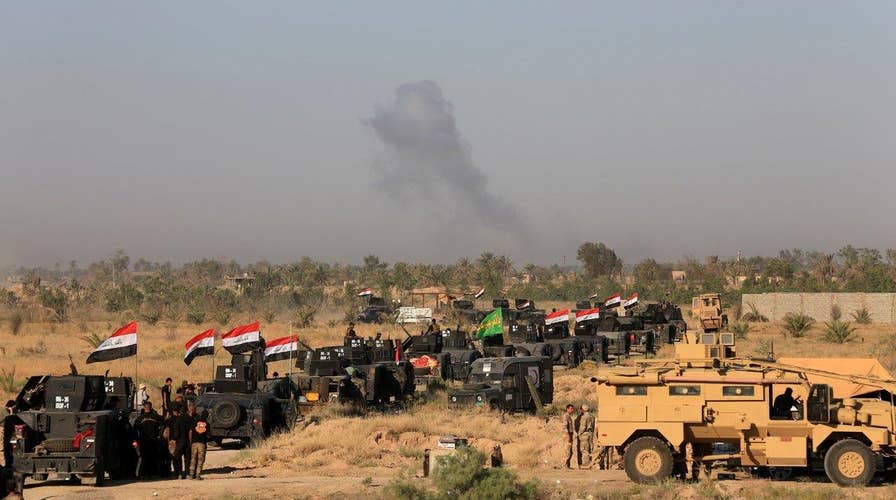"Several hundred" innocent families were trapped in the center of the bloody battle for the Islamic State's Iraqi hub of Fallujah, used as human shields for the terror group, the United Nations refugee agency warned on Tuesday as a leading aid group called it a "human catastrophe."
The fighting left at least seven members of one family dead or wounded on Saturday, UNHCR spokesperson William Spindler told reporters. An estimated 50,000 people remained trapped.
"They are locking some families down inside the hospital building," Salem al Halbusi, who lived in Fallujah, told USA Today. "They are making people freak out over the (arrival of) Iraqi forces by telling them, 'The army and militia are coming to kill you all.'"
Iraqi forces battling their way into the city repelled a four-hour ISIS attack in the city's south on Tuesday, a day after first moving into the southern edges of the militant-held city with the help of U.S.-led coalition airstrikes. The attack started at dawn in Fallujah's Nuaimiya area where Iraqi troops captured almost 85 percent of the ground the previous day, two officers with the special forces told The Associated Press.
Pentagon spokesman Capt. Jeff Davis described Fallujah as "the last bastion of ISIS control in Anbar Province," adding that the terrorists "intend to put up a fight." Officials told Fox there were between 500-1,000 ISIS fighters in Fallujah.
ISIS fighters "distributed some sweets for kids for the first time, trying to get people on their side, as they know their end is so close," al Halbusi added.
"A human catastrophe is unfolding in Fallujah," Secretary General of the Norwegian Refugee Council Jan Egeland said, adding that only one family managed to escape from the town on Monday. Since the offensive began a week ago, 554 other families have escaped from areas surrounding Fallujah, which lies 40 miles west of Baghdad. "Warring parties must guarantee civilians safe exit now, before it's too late and more lives are lost," Egeland added.
The NRC group, which is working with refugees and internally displaced people in Iraq, said lack of food, medicine, safe drinking water and electricity in the city was "pushing families to the brink of desperation."
The Pentagon was also concerned that more than 10,000 Iranian-backed Shia militias had amassed outside northern Fallujah, officials told Fox News. A year ago, ISIS took control of nearby Ramadi and it took U.S.-backed Iraqi forces six months to rid the city of hundreds of ISIS fighters. One Iraqi general was quoted as saying 80% of the Iraqi military’s success there was due to U.S. airstrikes.
ISIS militants used tunnels, deployed snipers and sent six explosives-laden cars to hit troops but they were destroyed before reaching their targets, the special forces officers said, speaking on condition of anonymity to discuss the ongoing campaign.
Iraqi forces suffered casualties, but the officers didn't give details.
Nuaimiya is a sprawling mainly agricultural area in Fallujah's south and Monday's push into it was the first attempt by Iraqi forces to enter the city after focusing on dislodging the militants from surrounding areas to tighten the siege.
Fallujah has been under Islamic State control for over two years and is the last major city in western Iraq still under control of the Sunni extremist group. The militants still control patches of territory in the country's north and east as well as the country's second largest city, Mosul.
The U.S. led coalition and Iranian-backed Shiite paramilitary forces are helping the Iraqi army in the battle to retake Fallujah. But the fight is expected to be long and protracted, given that ISIS militants have had more than two years to dig in.
Tunnels — similar to those found in other territory long held by ISIS — have already been discovered in the northeastern outskirts of Fallujah.
The Iraqi counterterrorism forces are leading the assault on Fallujah, slowly moving up from the southern edge. Their advance is expected to be slow also because tens of thousands of civilians remain trapped in Fallujah and hidden bombs are believed to be strewn throughout the city, according to special forces' commanders at the scene.
The extremist group is expected to increase attacks in major Iraqi cities in an attempt to distract the security forces' attention away from the front lines. On Monday, ISIS claimed responsibility for a wave of bombings in and around the capital, Baghdad, that killed at least 24 people and wounded dozens.
Fox News' Lucas Tomlinson and The Associated Press contributed to this report.









































